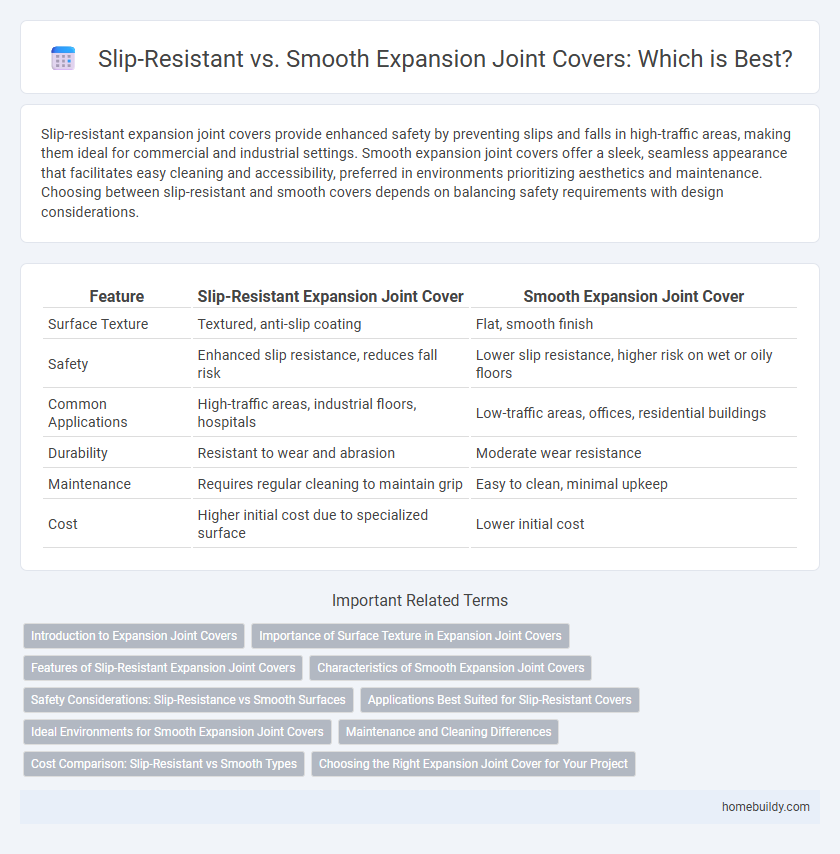Slip-resistant expansion joint covers provide enhanced safety by preventing slips and falls in high-traffic areas, making them ideal for commercial and industrial settings. Smooth expansion joint covers offer a sleek, seamless appearance that facilitates easy cleaning and accessibility, preferred in environments prioritizing aesthetics and maintenance. Choosing between slip-resistant and smooth covers depends on balancing safety requirements with design considerations.
Table of Comparison
| Feature | Slip-Resistant Expansion Joint Cover | Smooth Expansion Joint Cover |
|---|---|---|
| Surface Texture | Textured, anti-slip coating | Flat, smooth finish |
| Safety | Enhanced slip resistance, reduces fall risk | Lower slip resistance, higher risk on wet or oily floors |
| Common Applications | High-traffic areas, industrial floors, hospitals | Low-traffic areas, offices, residential buildings |
| Durability | Resistant to wear and abrasion | Moderate wear resistance |
| Maintenance | Requires regular cleaning to maintain grip | Easy to clean, minimal upkeep |
| Cost | Higher initial cost due to specialized surface | Lower initial cost |
Introduction to Expansion Joint Covers
Expansion joint covers are essential components in building construction that accommodate structural movement while protecting joints from damage and debris. Slip-resistant expansion joint covers provide enhanced safety by preventing slips and falls in high-traffic or wet environments, making them ideal for commercial and industrial settings. Smooth expansion joint covers offer a sleek, seamless appearance suitable for aesthetic-focused applications but may lack the traction benefits of slip-resistant options.
Importance of Surface Texture in Expansion Joint Covers
Surface texture in expansion joint covers plays a critical role in safety and functionality, with slip-resistant designs significantly reducing the risk of slips and falls in high-traffic areas. Slip-resistant expansion joint covers enhance traction by incorporating textured materials or coatings, making them ideal for pedestrian walkways, commercial buildings, and industrial sites. In contrast, smooth expansion joint covers offer easier cleaning and maintenance but may compromise safety where moisture, debris, or oily conditions increase slip hazards.
Features of Slip-Resistant Expansion Joint Covers
Slip-resistant expansion joint covers feature textured or coated surfaces designed to enhance traction and prevent slips in high-traffic areas. These covers are typically made from durable materials such as rubber or metal with anti-skid patterns, making them ideal for commercial and industrial applications requiring safety and compliance with slip-resistance standards. Their robust design also accommodates structural movement while maintaining a secure walking surface under various environmental conditions.
Characteristics of Smooth Expansion Joint Covers
Smooth expansion joint covers feature a sleek, flat surface designed to accommodate building movements while minimizing tripping hazards. These covers excel in environments requiring easy cleaning and aesthetic continuity, such as commercial spaces or hospitals. Their low-profile design allows for seamless integration with flooring materials, enhancing both safety and visual appeal.
Safety Considerations: Slip-Resistance vs Smooth Surfaces
Slip-resistant expansion joint covers enhance safety by providing increased traction, reducing the risk of slips and falls in wet or oily conditions. Smooth expansion joint covers, while easier to clean, may pose higher slip hazards, especially in high-traffic or industrial environments. Selecting slip-resistant materials is critical for compliance with workplace safety standards and minimizing accident liability.
Applications Best Suited for Slip-Resistant Covers
Slip-resistant expansion joint covers are ideal for high-traffic areas such as commercial buildings, hospitals, and airports where enhanced safety is essential to prevent slips and falls. These covers provide superior grip on walkways, ramps, and entrances exposed to wet or oily conditions, ensuring reliable performance in environments prone to moisture. Smooth expansion joint covers are better suited for areas with light foot traffic or where aesthetic continuity and easy cleaning are prioritized over slip resistance.
Ideal Environments for Smooth Expansion Joint Covers
Smooth expansion joint covers are ideal for environments requiring easy cleaning and minimal debris accumulation, such as hospitals, laboratories, and clean rooms. Their flat surfaces reduce tripping hazards and facilitate seamless integration with flooring materials, enhancing safety in high-traffic areas. These covers perform best in indoor settings with controlled conditions and low exposure to abrasive elements.
Maintenance and Cleaning Differences
Slip-resistant expansion joint covers require more frequent cleaning to remove accumulated dirt and debris from textured surfaces that can trap particles, ensuring safety and performance. Smooth expansion joint covers offer easier maintenance with simpler cleaning processes, as their flat surfaces allow quick removal of dust and spills using basic tools. The choice impacts long-term upkeep costs and cleaning time, favoring smooth covers for low-maintenance environments while slip-resistant options prioritize safety in high-traffic areas.
Cost Comparison: Slip-Resistant vs Smooth Types
Slip-resistant expansion joint covers typically involve higher initial costs due to specialized materials and added surface treatments designed to enhance traction and safety. Smooth expansion joint covers are generally more cost-effective upfront, relying on simpler construction and less expensive finishes. Over time, slip-resistant covers may reduce liability risks and maintenance expenses related to slip accidents, potentially offsetting the higher initial investment.
Choosing the Right Expansion Joint Cover for Your Project
Slip-resistant expansion joint covers provide enhanced safety by reducing the risk of slips and falls in high-traffic or wet environments, making them ideal for commercial and industrial projects requiring durable pedestrian protection. Smooth expansion joint covers offer a sleek finish and ease of maintenance, suitable for areas with minimal foot traffic or aesthetic-focused architectural designs. Selecting the appropriate cover depends on project-specific factors such as safety requirements, usage intensity, and environmental conditions to ensure optimal performance and longevity.
Slip-resistant expansion joint cover vs Smooth expansion joint cover Infographic

 homebuildy.com
homebuildy.com